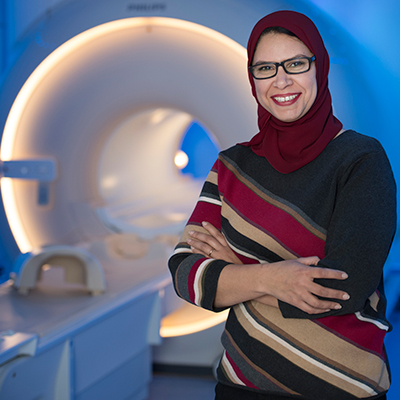Researchers from the University Nottingham, in partnership with colleagues from the University of Adelaide, have secured a £500,000 grant from Diabetes UK as part of a £1m research project using pioneering neuroimaging techniques to identify how the tongue and digestive tract sense sweet stimuli and integrate this signalling in the brain of people with type 2 diabetes.
It is hoped that the findings will inform the development of new personalised dietary and drug treatments for people living with prediabetes or type 2 diabetes.
The award is among successes being celebrated at an event to mark the second year of the Adelaide-Nottingham Alliance, a strategic global partnership between the University of Adelaide and the University of Nottingham.
Vice-Chancellors host symposium
The University of Nottingham's Vice-Chancellor, Professor Shearer West CBE, is hosting a symposium at University Park on Monday 13 May 2024, when staff, students and researchers from both universities will meet to share ideas and spark new collaborations.
Dr Sally Eldeghaidy, of the School of Biosciences, the University of Nottingham, and Professor Amanda Page of the School of Biomedicine, the University of Adelaide, will update on the research supported by Diabetes UK at the symposium.
The Adelaide-Nottingham team will use a sophisticated brain imaging technique, functional magnetic resonance imaging (fMRI), to identify how sweet sensing is communicated from the tongue and gut to the brain in individuals with and without type 2 diabetes or prediabetes.
Habitually eating too much sugar can lead to weight gain, and carrying too much weight is one of a complex mix of factors that increase the risk of type 2 diabetes. The research will explore sensitivity to sweet flavours in people with prediabetes or type 2 diabetes and how this relates to reward processing in the brain, dietary intake and regulation of blood glucose levels.
Much of the fMRI research will take place at a new national facility for ultra high-resolution imaging at the University of Nottingham, which will house the most powerful MRI scanner in the UK.
The 11.7 Tesla scanner will sit alongside already world-leading MRI facilities at the Sir Peter Mansfield Imaging Centre. Expertise at University of Adelaide, including research by Assistant Professor Richard Youngs on intestinal sweet sensing in type 2 diabetes and innovations of Professor Page on animal models of gut-brain axis to nutrition, was also instrumental in securing the Diabetes UK grant.

The potential benefits of this research are profound. By understanding the neuronal pathways of sweet sensing and metabolism and how this is affected in people with type 2 diabetes, we can contribute to more tailored dietary advice that could improve the quality of life and health outcomes in people with prediabetes or type 2 diabetes.
She added: "Additionally, our findings may influence future guidelines on food manufacturing and public health policies related to dietary sugars, potentially impacting a wide spectrum of the population, from prevention strategies in at-risk groups to management approaches in diagnosed individuals."
Dr Lucy Chambers, Head of Research Communications at Diabetes UK, said: "We are delighted to fund this innovative research at the University of Nottingham and the University of Adelaide that will build understanding of type 2 diabetes and potentially inform the development of new treatments that could benefit millions of people in the UK, Australia and across the world."
Collaborative research themes
Dr Eldeghaidy and Professor Page are respectively the UK and Adelaide leads of Intelligent Health, one of the collaborative research themes of the Adelaide-Nottingham Alliance. The symposium will also hear from researchers and PhD students working across the Alliance's other leading areas of collaborative research.
Global Food Systems researchers will highlight projects including Plants for Space, where University of Nottingham researchers are playing a key role in the University of Adelaide-led Centre for Excellence in Plants for Space , which aims to create on-demand, zero-waste, high-efficiency plants and plant products to feed future space missions, while applying this science to sustainable solutions on Earth.
The symposium will also highlight research into building Sustainable Futures, and preview the First International Conference of Net Zero Carbon Built Environment, at the University of Nottingham in June 2024.
Professor West will welcome her counterpart, Professor Peter Høj AC, Vice-Chancellor and President of the University of Adelaide, at the symposium.
Decades of friendship
She said, "Professor Høj and I are both excited by the potential of our universities' strategic global partnership, which has grown out of decades of friendship and collaboration between Adelaide and Nottingham. We will hear researchers from Adelaide and Nottingham talk about their collaborations on exciting projects, and how by sharing our world-leading expertise in food, sustainability, and health research, we will have even greater impact on these global challenges."
Professor Høj added: "Our alliance with Nottingham is the most significant between two universities in the UK and Australia. We each have a global reputation and a shared passion for innovation, and for training the research leaders and change-makers of tomorrow. By encouraging collaboration between our researchers, we deepen the impact and reach of our discoveries, and by giving our students the opportunity to spend significant time in Adelaide or Nottingham we enrich their studies and encourage them develop a global mindset."
As well as the funding award from Diabetes UK, highlights of the Adelaide-Nottingham Alliance's first year include:
- 29 enrolments on the Alliance's Joint PhD programme
- Collaborated on 6 externally funded research projects, attracting more than $50m/£24m in funding
- $187,000 / £98,000 seed funding to explore and kick-start new collaborations in research and education






